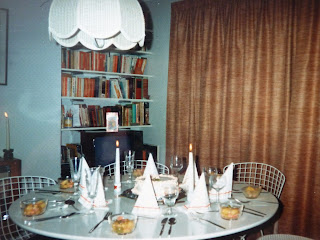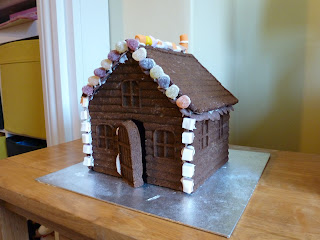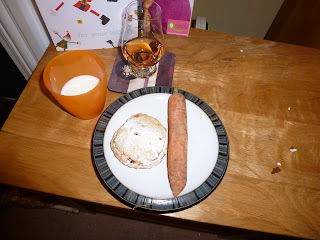My
favourite TV family of the year - the Robshaws - came back for two Christmas specials. Hooray!
To explore Christmas dinner, obviously, and how it - and the day itself - changed between the 1940s and 1990s. For each decade they moved to a different house that looked the part in its furnishings and architectural design. With the odd added grand piano.
They start off in World War II. They have to make their own Christmas tree out of scraps of wood and paint it green. They also have to make their own Christmas presents - a spinning top, a seed driller, and sticky carrot fudge. They are given asbestos snow to play with. (Well, not really, but pity the poor 1940s sods who genuinely were.) Dinner is stuffed ox heart. Dad Brandon looks relieved to be called up for Home Guard duty immediately after it is dished up. Pudding looks like our "traditional" family recipe, which includes carrot, apple and potato. Ours is delicious, but the Robshaws' is somewhat spoiled when the girls make a sauce for it that mistakes salt for sugar. Still, at least it means their extra Christmas sugar ration will last into January.
And then - since we are in the Blitz - it's off to the local air raid shelter, where Lionel Blair is waiting. Brandon excitedly gets out his ukelele and they have a little sing-along while Lionel reminisces about performing on Piccadilly Line platforms as a boy. The air raid siren still sends a chill down his spine. The bombing stopped for Christmas in December 1940, but it could hardly have been construed as Peace on Earth in London that year. 100,000 incendiary devices were dropped on the city just a few days later. The stress must have been unbearable. It puts the scrum of panic-buying parents desperate to get their hands on a Tinky Winky 60 years later rather in perspective.
In the 1950s, the Robshaws get a real tree, albeit a slightly threadbare one. Rationing is over. The house is light and colourful - the blackout curtains, and the gloom, have gone. There is a cocktail party, where Rochelle serves canapes of anchovies, olives and Spam, washed down with Snowballs. The olives have apparently been popularised by an influx of Italian migrants. The Spam (opened by the world's scariest tin opener) presumably hasn't. On Christmas Day the family - like most would have done - go to church. They eat ham and tinned peaches for dinner, wheeled in on the world's wobbliest trolley. Mum is given a new pinny, the girls get books on ladies etiquette and "old lady" scarves. Then (while Mum does the washing up) the boys head off on the bus (yes, the bus, on Christmas Day!) to a football match. Apparently the last full bus service on Christmas Day was in 1979. By then the traditional Christmas Day footie matches had moved to Boxing Day. The Robshaws also see the Queen's first Christmas television broadcast.

In the 1960s, the house and hair go all
Mad Men on us. It may be properly cold out (ice skating and everything), but there are plenty of luxuries inside as it is boomtime. The Robshaws get their first artificial tree and go to the panto, which in the 1960s would have starred the likes of Cliff Richard or Sid James. They have to make do with Christopher Biggins in Greenwich. Turkey makes its first appearance at the dinner table, thanks to factory farming making it affordable. For presents, they give each other cigarettes. Even the kids get smoking-themed chocolate. Rochelle also gets a new hoover, and Fred the son a Johnny Seven full weapons kit, which just looks so wrong through 2015 eyes. Brandon is very jealous.
This wish-fulfilment for the adults continues into the 1970s, when Giles Coren (dressed as Santa) finally gets the Evel Knievel toy he so coveted as a boy. (It turns out to be a bit of a disappointment.) The amount of presents being given has risen sharply, and the children choose their wish list from the Argos catalogue - a Polaroid camera, a chopper bike, a lava lamp. (Man, I LOVED the Argos catalogue as a kid.) Though Fred is unimpressed when what he is actually given is a Battleships game, deeming it to be far too "Boring!". The 1970s games of Frustration and Mastermind and an Etch-a-Sketch get a warmer reception, though mostly from the nostalgic adults. A pop-a-matic dice! But nobody can remember what exactly was frustrating about Frustration. Can you?
All this despite the 1970s being another time of austerity, with frequent power cuts and the government urging restraint on the Christmas lighting.
The 1970s were also when the race for the Christmas number one started. The Robshaws go to meet David "Kid" Jensen, the only 1970s DJ still allowed to appear in public, at a record shop. When they get home they dance to Slade's
Merry Christmas Everybody. More shivers down the spine, but not quite the same level of dread. Brandon wants to learn the chords on his ukelele. He certainly has some dance moves.
Real trees are back in vogue, now they have been sprayed with fire-proofing chemicals. But the tinsel is out of control. And ooh, those garlands. We had loads of those in our lounge. So bad.
The turkey for dinner is now frozen, which results in days of defrosting in a bucket and a much higher risk of food poisoning. "Maybe I won't have any," says Mum Rochelle, "In case anyone needs medical assistance." On the plus side it means that the sprouts are pre-prepared and frozen too, saving Rochelle much time in the kitchen. Sprouts it seems are the only constant of dinner every decade. As is Rochelle being in the kitchen. And goodness me, they are eating off the same circular white dining room table that we had at home!
 |
| Still very much in use in the 1980s |
The 1970s also sees the first starter at Christmas dinner - deep-fried avocado stuffed with Brie. There are 4000 calories in the dinner - in the 1970s we ate 40% more saturated fat than we do today. There is a deep fryer actually integral to the kitchen. The house is full of nibbles - chocolates, sweets and nuts, so that people can graze all day. Time to veg out in front of the television - but only three channels to choose from, all showing comedy. Mike Yarwood, The Two Ronnies, and a Morecambe and Wise classic that got 28 million viewers when first broadcast and still makes us laugh today.
The 1980s mark the switch from comedy classics to the soap opera cliffhanger on Christmas Day. "Merry Christmas, Ange!" snarls Dirty Den as he serves up her divorce papers. The Robshaws go off to meet Pat Butcher/Evans in the Queen Vic. She says that seeing everyone being miserable in
EastEnders helps people put their own problems into perspective. As does seeing people starving in Ethiopia on harrowing news footage presented by Michael Buerk. The images still shock today. As do the appalling haircuts on the Band Aid video.
 |
| My second ever single. I won't admit to the first. |
Back in their "squishy and pink" 1980s house which is big enough for their shoulder pads and hair, exotic fruit is on the menu. Mango! Kiwi fruits!
The house is now supposed to be decorated according to a theme suggested by a magazine. The Robshaws choose one in Tory blue. For gifts, there are executive toys, fluorescent earrings, power beads, Trivial pursuit and a genuine fur coat. "It's the dog!" wails Rochelle. And the family get their first computer. Just like our BBC Micro B, plugged into the television. They rustle up a turkey salad and a trifle using the aforementioned exotic fruits. But somebody forgets to make them taste nice. "Underwhelming," complain the teenagers, to the sound of the Pogues.
 |
| Home sweet home |
Finally the Robshaws are back in their own house for the 1990s. The Christmas season is getting longer and starting ever earlier. The Spice Girls switch on Christmas lights on Oxford Street in November. And people are switching on lights outside their homes as well as inside.
An average of 135 pounds is being spent on presents for each child. Most of it on credit cards. The stocking, still there with its tangerine, is now mostly an aside to the enormous games consoles being bandied around as gifts. The Robshaws say they are going to need a new house to store all the presents: it's too much.
A billion Christmas cards are being sent every year. The first e-Card appears in 1992, but as only about 20% of households have internet access at the end of the 1990s, most still rely on the traditional envelope in the post. The Robshaws sit and type their first "round robin" letter on the computer. They get into the spirit of the thing, telling big show-offy lies about how great and successful they are. They are of course great and successful - they have their own TV series for starters, although they don't mention this. Instead the letter starts with "We had a big extension with a lovely patio" and ends with "Brandon won Eurovision". And they pity the recipients for their lesser achievements.
Gary Rhodes turns up to cook the Robshaws a Christmas breakfast - Eggs Royale. The Christmas dinner comes from a massive supermarket shop (plainly not being done on Christmas Eve since the supermarket is empty and civilised). The 1990s is the decade when everyone's Christmas dinner starts to taste the same, as more and more people rely on all the trimmings (and there are a lot of trimmings) being ready-made and mass produced. Only unlike in the 1970s or 1980s, it all tastes pretty good.
Depressingly, most Brits name drinking as their favourite Christmas activity.
 |
| Mulled wine for Mummy |
 |
| And Amontillado for Santa |
Mum Rochelle claims at the start of the show that she is not a fan of Christmas as she finds it stressful. Taking it back to simpler times when it was just a short-term holiday rather than something vastly overcommercialised that lasts for weeks takes the stress out of it. It also shows us how to appreciate it more, and to see the traditions that lie behind everything we do today. Brandon says that every decade has has its own social problems - war, power cuts, unemployment - but that Christmas is always a light shining in the darkness to give people something positive to focus on.
And it ends with them dancing in the snow. We always want snow. "I'm dreaming of a white Christmas..." Our daughter EXPECTS a white Christmas. She was sorely disappointed last year and I expect this year will be the same. She will be the one shouting her parents out of bed early in the morning, just like the Robshaw children.
